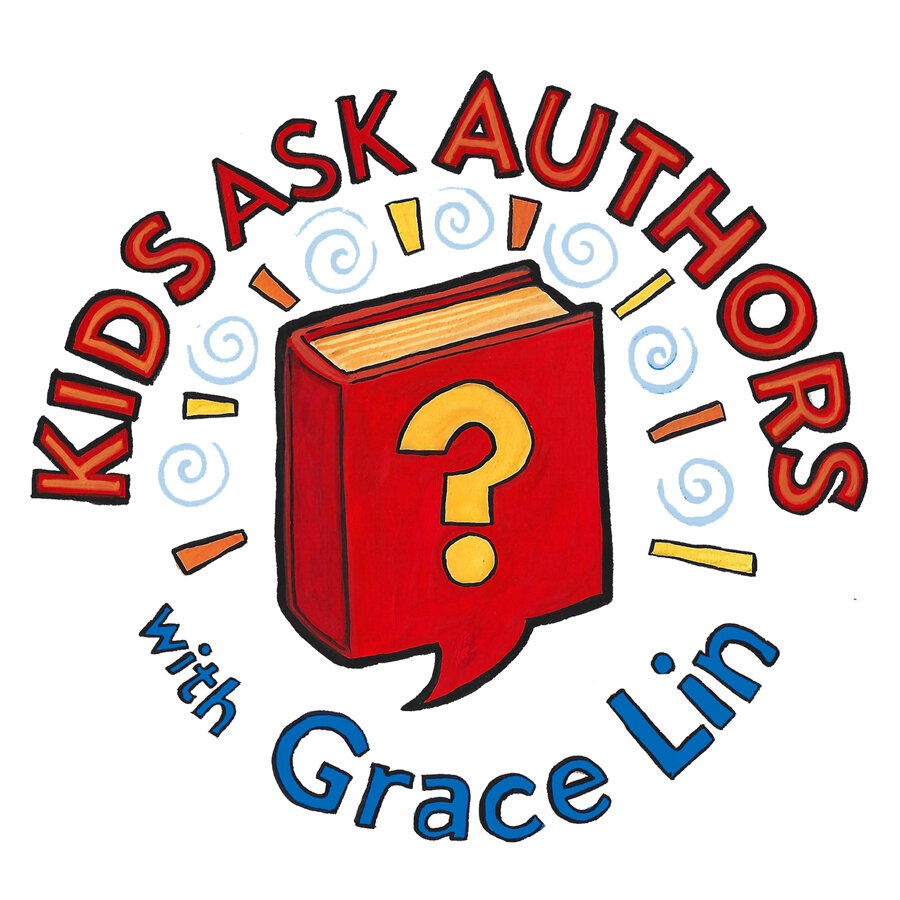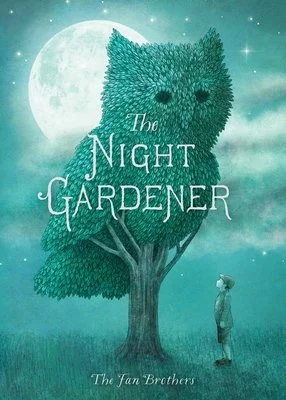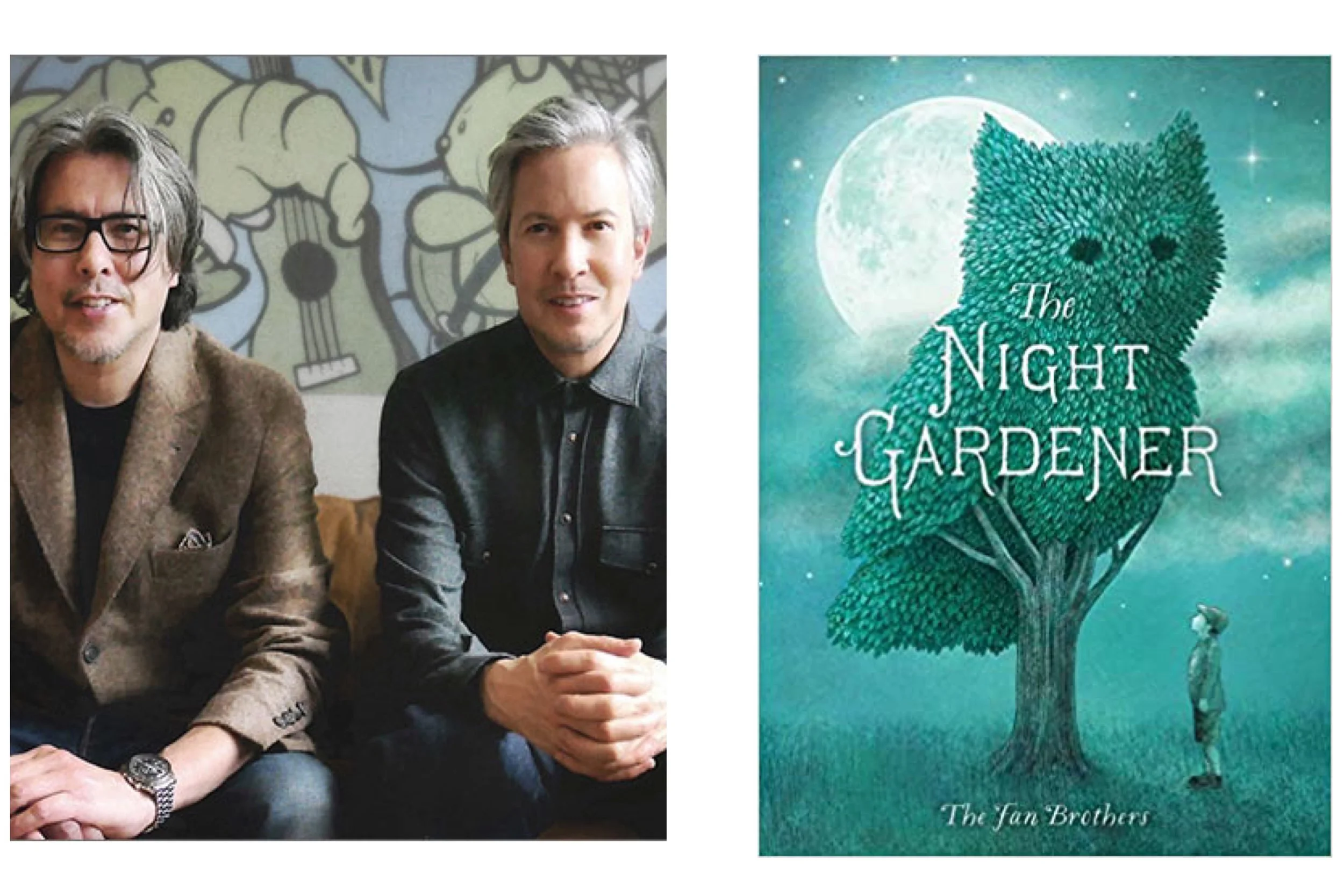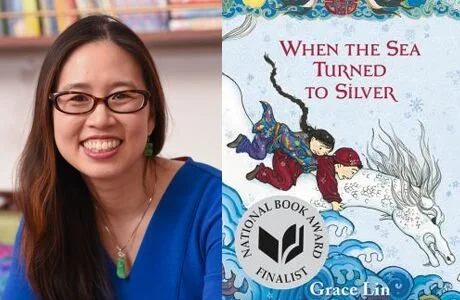Episode #124: Is there a book that you decided not to make? with Eric and Terry Fan
Welcome back to Kids Ask Authors! Today we welcome special guests, Eric and Terry Fan to answer a wonderful kid question. We’ll also hear a book review from Domenica!
TRANSCRIPTS:
Grace Lin: Hello. I'm Grace Lin, children's book author and illustrator of many books, including the middle grade novel, 'When the Sea Turned to Silver' and the picture book, 'A Big Mooncake for Little Star'. Today, I am here with Eric and Terry Fan, the authors and illustrators of many picture books, including 'The Night Gardener', and 'It Fell from the Sky'. You can see some of their childhood art, next to their adult professional work, online today at the virtual exhibit 'Now and Then'.
Grace Lin: Hi, Eric and Terry.
Eric Fan: Hi, Grace.
Terry Fan: Hi, Grace.
Grace Lin: Thanks for joining me today.
Eric Fan: Oh, gosh.
Grace Lin: Okay. I'm so happy to hear and see both of you. And I have a kid question for you. Are you ready for it?
Eric Fan: We're ready.
Grace Lin: Okay. Today's question is from a kid named [Joya 00:00:52]. And Joya asks...
Joya: Is there a book that you decided not to make?
Grace Lin: Is there a book that you decided not to make? Why?
Eric Fan: So, there have been a couple ideas we've had, that for one reason or another, we just never turned into a book. We were thinking about a book called, 'The Fantastic Voyage', which was going to be a smart octopus, who finds this old sunken submarine, and turns it into an airship, because he wants to explore the world. And the reason we never really pursued this, we had a hard time unlocking the story, and finding an ending. And then, one of our friends came up with a similar idea. So, we said, "Yeah, we don't want to do the same idea as another author/ illustrator." So...
Grace Lin: Was it harder for one of you to give up more than the other?
Eric Fan: Well, it was inspired by an illustration Terry had done.
Terry Fan: Yeah. By the same name; 'The Fantastic Voyage'. And it was, basically, this submarine in the air, with air balloons attached to it. And it was filled with ocean water, and there were some sea creatures in it. And at the helm was this octopus.
Eric Fan: But, yeah. It was like a reverse submarine. Instead of going into the water, they were taking the submarine to explore the world of [crosstalk 00:02:29].
Terry Fan: Yeah. It was a very old idea. We always thought, there's a cool story behind this. And we did develop it quite a bit, but we did run into these roadblocks, where we just couldn't figure out a couple things that were problems in the story.
Eric Fan: And given enough time, maybe, we would be able to. But then, like I said, when you see someone else has a similar idea...
Terry Fan: Yeah, yeah. And that happens more often than you think. That type of synchronicity.
Eric Fan: Yeah, exactly.
Terry Fan: It's inevitable. It's just, there's so many creative people out there, and they're all trying to think of cool ideas, and there's bound to be some-
Eric Fan: Overlap with that. Yeah.
Terry Fan: ... overlap. Even the latest book we're working on, which is about a [cloud 00:03:22]. And then, I was talking with our editor the other day, and she said, "Oh yeah, we have quite a number of cloud books in the world." So I was like, "What?" But that happens. Yeah, it's strange.
Grace Lin: So, what are some other... There's two questions I wanted to ask you from what you were saying. First, let's go to the octopus story. What was one of the problems that you ran into, that you'd be willing to share?
Eric Fan: I think I dissect it too much! But I think one of the logistic problems we had, was figuring out how this octopus was supposed to be kind of a genius. And he's found trash in the ocean, like an old globe. So he knows there's a world out there. But I think what the first story problem was, even finding this sunken submarine, is just the logistics of turning that into a... [crosstalk 00:04:28]
Terry Fan: Well, we had this idea that maybe it was in a reef, or maybe even the Bermuda Triangle, where there was a lot of wreckage. And this clever octopus was trying to figure out a way to put things together to create the ship. But it was always a little bit awkward, and we could never find an elegant solution, really-
Eric Fan: Yeah.
Terry Fan: ... to get that submarine out of the water, into the air.
Eric Fan: We knew he wanted to explore the world, but we never really had a good, I don't think, a really strong ending for that either, in terms of resolving everything. We threw around ideas, but just never quite... Some stories come together quickly and-
Terry Fan: Yeah.
Eric Fan: ... some you have to work on for a long time.
Terry Fan: And the ones that we usually end up working on, are ones that just almost write themselves. Where when we're talking about it, it just flows, and it all comes together. And yeah...
Eric Fan: Yeah.
Terry Fan: Most of the time.
Eric Fan: Sometimes, if you're really struggling with a story, sometimes it's a sign that you should move on to something else for a while, and-
Terry Fan: Yeah. Or drastically alter it, in some way.
Eric Fan: Yeah. Or... Yeah.
Grace Lin: So, my second question, about what you're you were talking about, was you mentioned, that a lot of times, it happens that you are coming up with a cool idea, and then somebody else comes up with a similar idea. That synchronicity you were talking about. Can you give us some more examples of that? I think kids would love to hear.
Eric Fan: I'm trying to think. It happens a lot. Terry and I used to do t-shirt designs before we started doing picture books. And often, you would see designs that people would have the same idea. They weren't copying each other. They just, by chance, came up with the same concept. I'm trying to think of some specific examples.
Terry Fan: Yeah. Especially with something like that. It's more prevalent, because when you're trying to think of some clever little idea, that's just one image.
Eric Fan: Yeah. Even for books, I remember when we came up with our first book, 'The Night Gardener', it wasn't the same idea, because it was a middle grade novel, and it was a totally different idea. But a book came out the same year, with the same title, 'The Night Garden'.
Terry Fan: Oh, yeah.
Eric Fan: And the-
Terry Fan: People were confused.
Eric Fan: Some of this confusion, when we went to events and stuff, people would say, "Oh, I loved 'The Night Gardener'". We'd say, "Thank you."
Eric Fan: "And so, which one of you is Jonathan Auxier."
Eric Fan: And then, we realized that they were talking about the middle grade novel. So, stuff like that happens.
Grace Lin: That's funny. Well, that's so funny, because when I asked you this question, I thought about the books that I decided not to make. And I know sometimes, the books I decide to make is because, at one point, I was doing this book that was based in China. And it was going to go to all these landmarks in China. And then, all of a sudden I realized, I don't want to draw all of this. And I just realized that drawing all these little, huge landscape scenes, and I've got all these people. And I was like, "It's going to take me two years to do this. And I like this book, but I don't love this book." And I remember that was a big thing that changed my mind.
Eric Fan: I think you have to love something, if you're going to tackle something really difficult.
Terry Fan: Yeah. And actually, I have to admit, that does come into it when considering projects. We have certain things that we're good at drawing, that we feel comfortable with; and it's certain themes, and certain subject matters. And then, there may be a story that's really cool, and really awesome, but we have to be able to see ourselves as being the right illustrators for it.
Eric Fan: Yeah.
Grace Lin: Yeah. I think-
Terry Fan: Sometimes, it comes down to just like, "Oh my God! I don't know if it can draw that. Or that seems really challenging, or...
Grace Lin: Yeah. And for me, I think, I get a lot of ideas. And the thing is, I have a lot of ideas, and some of them I like. But then I realize, do I like this enough for me to sit down, and actually make a book that's probably going to take me at least a year?
Terry Fan: A year.
Grace Lin: Probably two, maybe three. I do have to love it. And then I realize, I'm like, "I don't like it that much."
Terry Fan: I think that's a very sensible and wise yardstick for it.
Eric Fan: I love your 'Mooncake' book. It's beautiful, by the way.
Grace Lin: Aw! Thank you.
Terry Fan: Oh, yeah. It's amazing. Yeah.
Grace Lin: Thank you.
Eric Fan: Actually, I saw you, I don't know if it was ALA or some book... But I remember I was lined up for a while, and then I had to go somewhere, but I wanted to get a... You were signing copies of it.
Grace Lin: Aw.
Eric Fan: It's a beautiful book.
Grace Lin: Thank you. I'd be happy to sign it for you, any time.
Terry Fan: Excellent.
Eric Fan: Excellent book.
Terry Fan: Yeah.
Grace Lin: All right. Well, thank you so much for answering Joya's question, and thank you, Joya, for asking it.
Eric Fan: Thanks, Joya.Terry Fan: Thank you, Joya.
Our Kid Book Review today comes from Domenica! Domenica is reviewing, The Night Gardener, by Eric and Terry Fan.
The book I would like to talk about is “The Night Gardener” written and illustrated by The Fan Brothers. This book is about a boy named William and everyone on his street. When they wake up in the morning, a tree seems to be in a fun shape, like a rabbit or fox. One time even a dragon! I liked this book because William tries to figure out who is doing it, and the pictures are amazing! Throughout the book, the pictures gradually get more colorful, as the town gets more cheerful and happy. I would recommend this book to younger readers, but it’s great for everyone!
Thank you Domenica!
More about today’s authors:
Brothers Terry Fan (left) and Eric Fan (right) received their formal art training at the Ontario College of Art and Design in Toronto. Their work is a blend of traditional and contemporary techniques, using ink or graphite mixed with digital. The Night Gardener was their widely acclaimed debut picture book. Terry spends his days (and nights) creating magical paintings, portraits, and prints. Visit him online at Society6, Redbubble, and Facebook (Terry Fan Illustration). Eric has a passion for vintage bikes, clockwork contraptions, and impossible dreams. See more of his work at Society6 , Redbubble, Fine Art America, and on Facebook (Eric Fan Illustration). They are represented by Kirsten Hall, at Catbird Agency.
Grace Lin, a NY Times bestselling author/ illustrator, won the Newbery Honor for Where the Mountain Meets the Moon and her picture book, A Big Mooncake for Little Star, was awarded the Caldecott Honor. Grace is an occasional commentator for New England Public Radio , a video essayist for PBS NewsHour (here & here), and the speaker of the popular TEDx talk, The Windows and Mirrors of Your Child’s Bookshelf. She is the co-host of the podcast Book Friends Forever, a kidlit podcast about friendship and publishing (geared for adults). Find her facebook, instagram , twitter ( @pacylin) or sign up for her author newsletter HERE.
Thank you so much for tuning into to Kids Ask Authors! We would appreciate your continued support on our Patreon page! Please consider becoming a member for all kinds of exclusive perks. https://www.patreon.com/kidasaskauthorspodcast
Order the 2022 WTMMTM CALENDAR: https://shop.carlemuseum.org/category/books/autographed-books/grace-lin
Sign up for Grace's author newsletter: https://lp.constantcontactpages.com/su/kEmJMT3/newsletter



